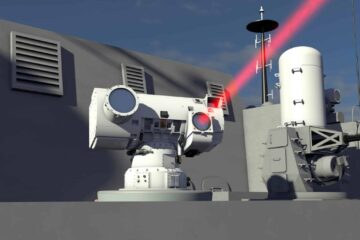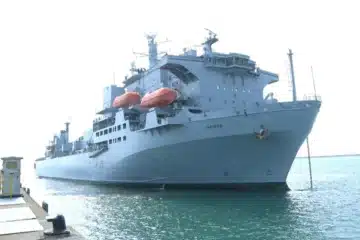Royal Navy press release
The ‘Queen’s Frigate’ – launched by Her Majesty in 1990 and named after her as the Duke of Lancaster – will become the second major Royal Navy warship to operate out of Bahrain on a three-year security mission.
From there, she will work with Allies and regional partners, providing security to UK and international shipping, and preventing the proliferation of arms and drugs smuggling which directly impacts the security of the Middle East and Europe.
Before Lancaster reaches her new operational theatre, she has extensive duties to perform in European and Mediterranean waters with NATO, as well as helping to push the boundaries of naval technology and robot craft.

She’s due to conduct patrols with two NATO task forces: firstly, Standing Group 1 whose flotilla of mostly frigates and destroyers sails the waters of northern Europe on security missions. And, later on her journey to the Gulf, Lancaster will take her place in the force’s Mediterranean counterpart, Standing Group 2, which conducts the same mission from the Pillars of Hercules to the Red Sea.
The work with the alliance’s two task groups bookend Lancaster’s involvement in NATO’s most important tech trials/exercises of the year: REPMUS and Dynamic Messenger, both staged off the coast of Portugal next month. More than 40 crewless systems are due to be tested at REPMUS – NATO’s largest autonomous war games – with craft above, on and below the waves all being assessed alongside regular warships such as HMS Lancaster.
The aim of the two exercises is to see how the uncrewed systems can operate safely and effectively with other NATO assets, and how collectively the participants from several allied nations can exploit the tech and harness the information autonomous systems gather. And then, after a stint with NATO Standing Group 2, Lancaster will pass through the Suez Canal, Red Sea and Gulf of Oman before taking her place in the Gulf alongside other Royal Navy and Royal Fleet Auxiliary ships operating in the Middle East.

Once in Bahrain, the 200-strong crew – including a Royal Marines boarding team and Wildcat helicopter flight – will trade places like-for-like with a second crew in the UK every four months. Known as ‘forward deploying’, it spares ships the month-long voyage to and from the Middle East, allowing more time to be spent on patrol, with maintenance carried out in the Gulf rather than back in the UK.
Lancaster’s sailors have trained extensively for their new mission, not least a six-week assessment package in March and April off Plymouth. Having stocked up on supplies and ammunition, the ship is now ready for the off.
“I am immensely proud of everything my ship’s company have achieved to prepare for this deployment. “Although our thoughts always turn to our loved ones at home when we depart the UK, we are very much looking forward to working alongside our international partners as part of a NATO Task Group over the coming months.”
Tom Johnson, Commanding Officer Commander






